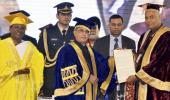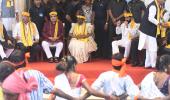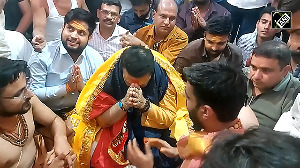The country's seventh president Neelam Sanjiva Reddy was the only one to be elected unopposed to the post in the history of independent India.

He succeeded Fakruddin Ali Ahmed after his death in 1977.
Ahmed breathed his last on February 11, 1977, a day after the Lok Sabha polls had commenced following two years of Emergency. Vice President B D Jatti had assumed office as acting President.
Elections to 11 state assemblies were also scheduled between June-July the same year and the presidential election was notified only on July 4.
Ironically, the electoral college comprising 524 newly-elected Lok Sabha members, 232 Rajya Sabha members, and legislators from 22 state assemblies, did not have to cast their votes in the presidential poll as Reddy was the only candidate left in the fray as nomination papers of 36 other aspirants were rejected.
While the 1977 poll was held amid unusual circumstances, the most interesting election was in 1969 when Reddy, the official candidate of the Congress, was defeated by Varaha Venkat Giri when the then prime Minister Indira Gandhi called for a "conscience vote" in her bid to trump her detractors within the party.
Over the years, the rules of the presidential elections have also been amended to keep out non-serious candidates, without even a remote chance of getting elected, entering the fray.
Another matter of concern was the manner in which some persons approached courts of law challenging the election to the office of the president.
Accordingly, it was made mandatory for any prospective presidential candidate to get his or her nomination paper subscribed by at least 50 electors as proposers and at least 50 electors as seconders.
The 16th presidential election on Monday would have 4,809 electors, comprising 776 MPs and 4,033 MLAs.
These include 233 Rajya Sabha members and 543 from Lok Sabha.
In the first presidential election in 1952, which Rajendra Prasad won, there were five contesting candidates with the last one getting only 533 votes.
The second election in 1957, which was also won by Prasad, had three contesting candidates.
The third election also saw only three contestants, but the fourth election in 1967 saw as many as 17 contestants with nine getting zero votes and five getting less than 1,000 votes.
In comparison, the winner of the 1967 election, Zakir Hussain, secured more than 4.7 lakh votes.
The fifth election had 15 contestants with five failing to secure even a single vote.
This election in 1969 had many firsts, including strict secrecy of voting and allowing some MLAs to cast their votes at Parliament House in New Delhi instead of their state capitals.
At that time, the decision to have a gap of four days between the date of the poll and the date of counting faced some criticism.
Some critics had also said the votes should have been counted at the state capitals themselves instead of being brought to Delhi.
It was for the sixth election in 1974 when the Election Commission first decided to introduce several measures to discourage non-serious candidates. The election had only two contestants.
For the seventh election in 1977, total of 37 candidates filed their nominations.
On scrutiny, the returning officer rejected the nominations filed by 36 candidates and only one validly nominated candidate remained in the field, Reddy.
Neither the preparation nor publication of the list of contesting candidates for taking the poll therefore became necessary and Reddy was declared elected unopposed after the last date of withdrawal.











 © 2025
© 2025